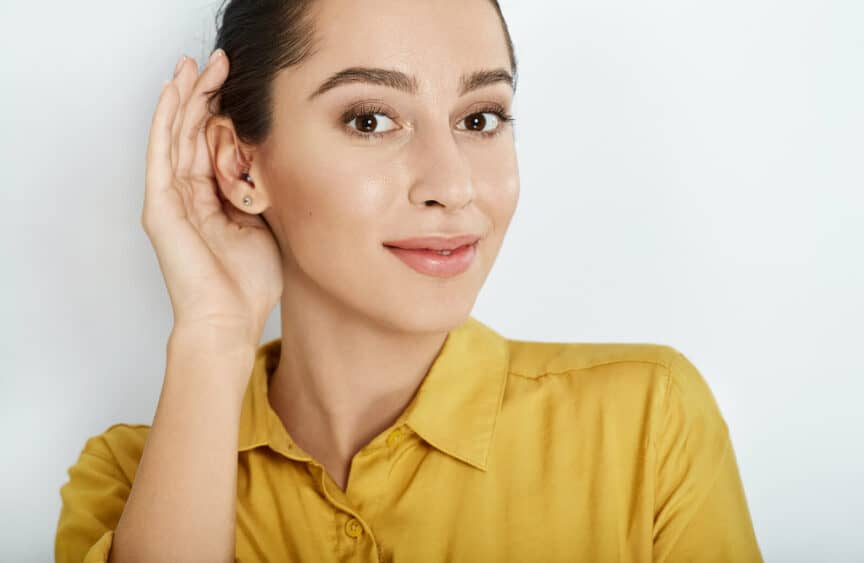Did you know that Millennials and Gen Z are also impacted by hearing loss? It is estimated that 10% of Millennials and 17% of Gen Z have some degree of impaired hearing. These demographics are also increasingly at risk of developing hearing loss due to loud noise exposure. According to the World Health Organization (WHO), over 1 billion people ages 12-35 are at high risk of developing hearing loss due to loud noise. If you are a Millennial or Gen Z, it is important to understand the hearing health risk you may experience and also the importance of prioritizing your hearing health.
Millennials, Gen Z, & Hearing Loss
The increasing risk of developing hearing loss among Millenials and Gen Z is largely due to loud noise exposure. Loud noise can irreparably damage the auditory system – the sensory system for hearing. Common sources of loud noise exposure for Millenials and Gen Z include the following:
- Earbud use: earbuds and headphones are common ways that people listen to audio – from podcasts to music and talking on the phone. While convenient, earbuds are also a common way people are exposed to excessive noise levels. Depending on the device they are connected to, earbuds can deliver noise that reaches 100 decibels (dB). For perspective, noise above 85dB is considered hazardous for hearing health.
- Work: according to the Hearing Health Foundation, over 22 million people are exposed to hazardous noise levels at work. Noisy work environments include: transportation hubs, construction sites, music venues, restaurants etc.
- Social life: another common source of loud noise exposure for Millennials and Gen Z include social life. This includes various social activities like concerts, games, parties, bars, clubs etc. These social settings can easily surpass 85dB, putting hearing health at risk.
It is important to take inventory of the noise levels you are regularly navigating. Fortunately, there are effective ways that you can protect your hearing health.
Noise Induced Hearing Loss
Loud noise exposure can cause noise induced hearing loss, a common type of hearing loss that people experience today. Sound above 85dB is considered potentially dangerous for hearing health. For perspective, this is equivalent to busy city traffic, a hair dryer, and a noisy restaurant during peak hours. One time or regular exposure to excessive noise can damage the sensory cells that are in the inner ear. There are thousands of these cells (in the cochlea) which play a major role in how sound is processed. These cells convert incoming sound waves into electrical signals that get carried to the brain. The brain is then able to continue processing these cells which includes assigning meaning to them, allowing us to understand what we hear.
Loud noise can desensitize or weaken sensory cells. This reduces their capacity to effectively process soundwaves, resulting in the brain receiving less auditory information. Unlike other types of cells we have, sensory cells do not regenerate. Humans are actually born with all the sensory cells in the inner ear that we will ever have. This means that any damage they experience is permanent, causing chronic noise induced hearing loss.
Tips to Protect Hearing Health
Noise induced hearing loss is completely preventable. There are safety measures you can integrate in everyday life to protect your hearing health. This includes the following practices:
- Wear hearing protection: there are different types of hearing protection including headphones, earbuds, earmuffs, earplugs etc. These items provide a physical barrier for the ears, reducing the amount of loud noise that is absorbed. Be sure to carry hearing protection with you so that you can protect your ears when navigating noisy environments.
- Use 50-60 rule: this rule recommends using 50%-60% of the total volume on your devices. This is a helpful way to maintain safe volume levels.
- Reduce loud noise exposure: there are various ways you can reduce your exposure to loud noise: take 5-10 minute listening breaks throughout the day, maintaining low levels on the TV and other devices, taking alternate routes to avoid traffic and construction sites, avoiding noisy environments and opting for quieter settings etc.
- Get hearing tested regularly: hearing tests are painless and noninvasive. They measure hearing capacities in both ears and identify any hearing loss. Getting your hearing tested regularly is a great way to track your hearing health and identify any changes you may experience early on.
Contact us today to learn more about how you can protect your hearing health and the resources as well as technologies that are available to support you!

